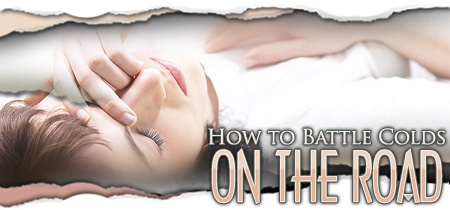
Easy Ways To Stay Healthy While Traveling
by
Rachel L. Miller
Doesn't
it feel like you have the worst luck sometimes? You're feeling healthy, strong
and ready for your next business trip. You make it through the long flight and
the first day of meetings. And then you wake up the next morning, congested, coughing
and sneezing. Your head is pounding and the last thing you want to do is get out
of bed.
There's
not much worse than being sick while you're traveling, whether your trip is for
business or pleasure. You don't want to miss out on the vacation of a lifetime,
nor do you want to jeopardize a big meeting with clients. So
what can you do? Of course, you should do everything you can do avoid getting
sick. The best way to do that is simple, according to Dr. Mark
Roberts, an occupational medicine specialist and former medical director for several
Fortune 500 companies.
"Do
what your mother taught you," he advises. "Use tissues and dispose of
them properly. Keep your hands away from your mouth. Have as much space as possible
between you and the next person on the plane." Also,
stick to your normal routine. "When you start traveling, it's easier to get
away from that routine. You eat different foods, your sleeping patterns might
change," Roberts says. When you change your routine, you might experience
adverse health effects. So, don't drink or eat more than you normally do -- and
make sure to get a good night's rest. And
of course, the cardinal rule in preventing sickness, wash your hands thoroughly
and often. Unfornately,
air travel makes it hard to stay healthy sometimes. "There's a lot of people
in small places," Roberts says. "The opportunity to share influenza
and cold viruses is very common." Even
if you take all the possible precautions, you can still get sick. Roberts says
that there are a few over-the-counter medications every traveler should have handy.
-
Headache medication. Advil, aspirin, Tylenol are common examples. "Make
sure it's whatever you normally take for headaches. Some medications can have
adverse effects, so make sure it's something you've taken before."
-
Antihistamine. Your basic cold medication. Again, make sure it's a medication
you've used before. "Make sure to read the fine
print, because some antihistamines can cause drowsiness, which means you might
not be in tip-top shape to make a presentation." Also, don't take more than
the recommended dose.
In
addition to the two medications listed above, Roberts also recommends having a
zinc gluconate glycine product (like COLD-EEZE®) to lessen the duration of
the common cold. "It reduces the number of days of symptoms," Roberts
says. "If your normal symptoms - stuffy nose, feeling blah - last four to
six days, this medication can reduce it by two days." Just
take COLD-EEZE® when you start to feel symptoms, along with an antihistamine,
and you should see a difference in the length of time of your illness. Of course,
you should always talk with your doctor before taking any new medication or combining
medications.
COLD-EEZE® comes is all-natural and comes in a few different forms - lozenges, sugar-free
tablets, nasal sprays and even suckers. You can find it at drugstores nationwide.
|